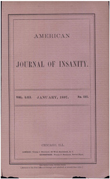Confidentiality dilemmas in group psychotherapy with substance- dependent physicians
Abstract
OBJECTIVE: The purposes of this article are 1) to review federal and state laws relevant to confidentiality in group therapy with impaired physicians and 2) to provide empirical data concerning the actual confidentiality practices and experiences of group therapists treating chemically impaired physicians. METHOD: In the clinical research phase, 25 state medical societies identified 45 rehabilitation centers as those to which the societies preferentially referred chemically impaired physicians. Fifty-one group leaders from 33 of these rehabilitation centers completed the survey questionnaire employed in this project. RESULTS: Because of the risk of potentially irreversible social and professional injury, physician patients were exceedingly concerned about breaches of confidentiality. Co-members' infractions most often involved the violator sharing with close friends and family members the name and abuse history of a fellow physician. In contrast, transgressors rarely leaked information about a co-member's drug- related illegal behaviour. CONCLUSIONS: Chemically impaired physicians would feel safer in sharing secrets in group therapy if more jurisdictions adopted legislation making co-members liable for violating confidentiality. Currently the pertinent body of law is confusing and inconsistent and provides little protection to impaired physicians who enter group therapy. The authors propose ideas for model legislation.
Access content
To read the fulltext, please use one of the options below to sign in or purchase access.- Personal login
- Institutional Login
- Sign in via OpenAthens
- Register for access
-
Please login/register if you wish to pair your device and check access availability.
Not a subscriber?
PsychiatryOnline subscription options offer access to the DSM-5 library, books, journals, CME, and patient resources. This all-in-one virtual library provides psychiatrists and mental health professionals with key resources for diagnosis, treatment, research, and professional development.
Need more help? PsychiatryOnline Customer Service may be reached by emailing [email protected] or by calling 800-368-5777 (in the U.S.) or 703-907-7322 (outside the U.S.).



